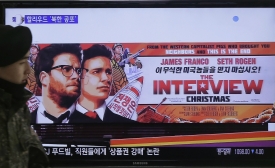kim jong un
The problem with “Dennis Rodman: Big Bang in Pyongyang,” primarily, is that the filmmakers decided to make a film about Dennis Rodman going to North Korea. The 93-minute documentary promises the unmistakable stench of a shit-show just in the title alone. So it’s not that surprising to discover that “Dennis Rodman: Big Bang in Pyongyang” is awful — both in the “shock and awe” sort of awful, as well as in the “absolutely terrible and affronting to humanity” kind of way.
Amongst the many ambiguities and unknowns surrounding “the great Sony hack” of 2014, one thing is clear: a non-state actor was publicly shamed—quite effectively—by a powerful state.

Alexander Lee White on how Obama should have responded to fallout from the Sony hack.
North Korea’s state-run news agency claims that suggestions Pyongyang was behind the cyber attack on Sony Pictures are “wild rumor.” But according to the New York Times and other media sources, U.S. intelligence officials have concluded otherwise. The attack, those officials say, “was both state-sponsored and far more destructive than any seen before on American soil.”
North Korea’s release of two detained Americans signals Kim Jong Un is responding to pressure from international sanctions over its weapons program and a probe of human-rights violations, analysts said.
But fearing that the West wants to prosecute their leader, Kim Jong Un, for human rights abuses, North Korean officials are beginning to rely on soft words instead of hard power.
The two Koreas briefly exchanged machine-gunfire across the border as speculation swirled about North Korean dictator Kim Jong Un, who hasn’t been seen in public for weeks and missed another official gathering Friday.
While refugees poured across the border to China telling stories of starvation and torture, in the other direction — thanks to the merchants — came foreign films, television shows and music stored on DVDs and USBs, a link to the prosperity and ways of the outside world. These shifts gave rise to North Korea’s very own millennials, a generation born in the 1990s who are independent, pragmatic and less politically attached than their predecessors, says Park. They’re also known as the “Black Market Generation.”







